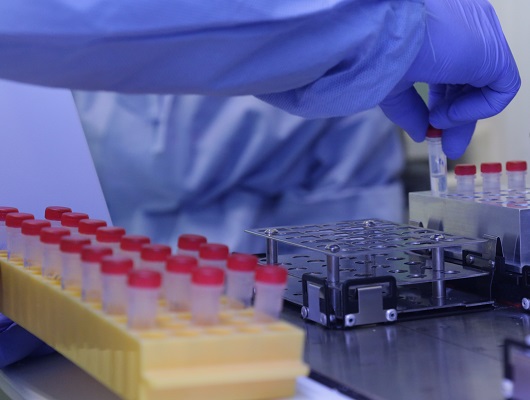Study shows action of molecules on the new coronavirus
03/09/2020
Lucas Rocha (IOC/Fiocruz)
Several patients infected with the new coronavirus (SARS-CoV-2) show an exacerbated inflammatory response caused by an exagerated activity of the patient’s immune system, in the attempt to protect the body from the pathogen. This activity is linked to significant lesions in the lungs and is one of the main factors associated to severe cases of Covid-19. To bypass this mechanism, researchers all over the world are looking for efficient ways to inhibit virus replication and to prevent or reduce the inflammatory process.

The results showed that viral production was reduced by up to 41% by the VIP molecule and up to 42% by Pacap (Photo: Josué Damacena).
Focusing on these issues, a trial by researchers of the Oswaldo Cruz Institute (IOC/Fiocruz) has shown that two neuropeptides, known as VIP and Pacap, molecules responsible for regulating several physiological functions, were capable of inhibiting replication of the Sars-Cov-2 in cells of the immune system (monocytes) and of the pulmonary tissue, in addition to attenuating the inflammatory process. The research also showed high levels of these molecules in plasma sample of infected patients who evolved into severe cases and then recovered.
The results of the study were submitted as preprint to bioRxiv, which allows for the accelerated publishing of research on the subject. The trial involved researchers of the Laboratory of Thymus Research and of the Immunopharmacology Laboratory, both of the IOC, in addition to specialists of the Evandro Chagas National Infectiology Institute (INI/Fiocruz) and of the Paulo Niemeyer Brain Institute.
Scientists observed that these neuropeptides showed activities in three fronts: by protecting the cells against alterations caused by the virus, by reducing the production of pro-inflammation mediators, and by blocking the activation of a mechanism involved in the production of these mediators. “In this experimental study, we saw that the VIP and Pacap neuropeptides showed the ability to inhibit Sars-CoV-2 replication and to control the inflammatory response induced by the infection. Previous studies had already shown that these same molecules also inhibit HIV-1 replication in primary human cells”, explained researcher Dumith Chequer Bou-Habib, of the Laboratory of Thymus Research for the IOC, one of the coordinators of the study.
Molecules inhibited viral replication
In the first stage of the study, specialists carried out in vitro experiments using human monocytes. The cells were treated with the two molecules, VIP and Pacap, and then infected with the new coronavirus. After 25 hours, researchers evaluated viral replication.
The experiments showed that the VIP molecule achieved up to 45% of inhibition of viral replication, while Pacap achieved 40%. The researchers also noticed that the compounds prevented cell death by protecting them against structural alterations caused by the virus, a mechanism known as cytopathic effect.
“The reduction in the viral production not only reduces the viral load to which the cells are exposed; it also reduces the stimulus for the excessive production of inflammatory factors, with an effect on cell death of the infected and non-infected cells in the culture. The same reasoning can be considered in the case of an infected individual. We consider these results to be quite satisfactory”, said Jairo Ramos Temerozo, a post-doctorate student of the Laboratory of Thymus Research of the IOC, who also coordinated the study. During a second phase, researchers investigated whether the molecules were capable of restricting viral reproduction in lung cells, which are one of the main targets of Sars-CoV-2.
The experiment used a lineage of pulmonary tissue cells that is highly susceptible to the virus, called Calu-3. The cells were infected and then treated with the molecules. The results showed that viral production was reduced by up to 41% by the VIP molecule and up to 42% by Pacap.
Control of inflammation
The researchers also evaluated whether the neuropeptides could attenuate the production of pro-inflammation mediators by pulmonary epithelial cells and by infected monocytes, i.e. if an attenuating action took place on the inflammation process. The treatment led to a reduction of 50 to 60% of inflammation mediators, both by the immune system cells and by pulmonary cells. The results suggest that these molecules can offer significant protection to infected lungs as a consequence of virus replication. Another finding of the study shows that the molecules were responsible for preventing the activation of a mechanism involved in the production of these mediators, contributing to reducing inflammation.
“The Sars-CoV-2 infects and destroys lung cells, triggering a severe inflammation that results in the compromising of the integrity and function of the lungs, and it can also affect other tissues and organs. It is therefore expected that agents capable of promoting a reduction of viral replication and of inflammation have a positive impact on the clinical status of patients with Covid-19”, explains Jairo.
Presence of molecules in patients’ plasma
Based on these results, the researchers measured the levels of both neuropeptides in plasma samples of individuals infected with the Sars-CoV-2. They discovered a significantly high quantity of the VIP molecule in patients with the most severe forms of the disease. The samples were compared with those of non-infected healthy people (control subjects) and with those of patients with mild symptoms or no symptoms at all. The results also showed increased levels of Pacap in severe patients.
“A deeper analysis of the data obtained from these clinical samples shows that increased levels of VIP in the plasma of individuals with the severe form of the disease were concentrated on the subjects who had recovered and survived. Combined with the data obtained from the in vitro studies, this piece of information reinforces the therapeutical potential of this neuropeptide”, he concluded.




